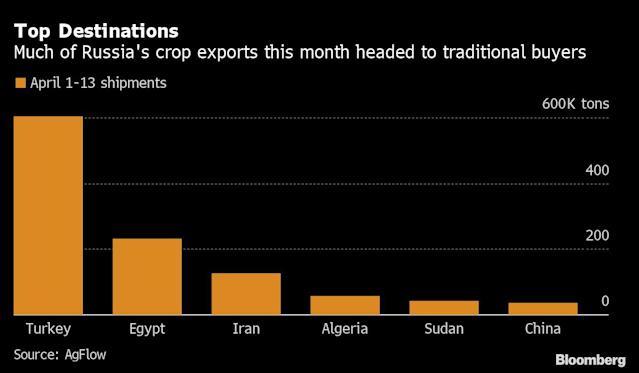Seven weeks after its invasion of Ukraine, Russia is still exporting grain to some of its biggest customers, even as shipping costs soar.
The main buyers remain Egypt, Turkey and Iran, said Dmitry Rylko, general director of the Moscow-based Institute for Agricultural Market Studies. The resilience of grain exports, despite sanctions and moves by some traders to shun Russian commodities, is pushing some market observers to raise their estimates for shipments this season.

Those shipments have spurred analysts like Strategie Grains to downgrade their outlook for wheat exports from the European Union, one of Russia’s biggest competitors. The U.S. Department of Agriculture last week also raised its estimate for Russian wheat exports in the current season to 33 million tons, though that remains short of the 35 million tons it forecast before the war.
Under Russian quotas, exports from February to June are limited to 8 million tons. The Russian Union of Grain Traders said earlier this week that it expects exports to slow in April, according to local newspaper Kommersant. IKAR’s Rylko also expects grain shipments to slow in the coming months compared with March due to a stronger ruble and high export taxes.
The ruble has strengthened to pre-war levels after Moscow imposed capital controls, forcing exporters to convert most of their overseas earnings into the Russian currency. Export taxes, which are linked to wheat prices, are at a record high of $101.40 a ton. That means Moscow generates revenue of about $3 million for every 30,000-ton shipment of wheat.
Shipping costs from the Black Sea region have also soared, climbing 50% to 80% from last year due to war risks, according to UkrAgroConsult. Fleets under non-Russian flags don’t want to enter Russian ports due to high insurance costs and sanctions, Evgeny Popov, chartering manager at St-Petersburg based shipping company Nitro, said by phone.
Russia’s Black Sea ports are still operating, and traffic is resuming in the Sea of Azov, according to Strategie Grains.
Still, nearby importers will weigh whether Russian wheat remains competitive versus origins further afield, said AgFlow Chief Executive Officer Nabil Mseddi. Egypt booked one cargo from Russia in its latest wheat tender on Wednesday, although France took the bulk of purchases.










